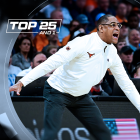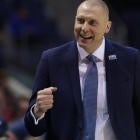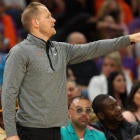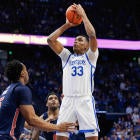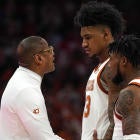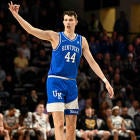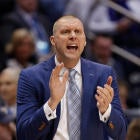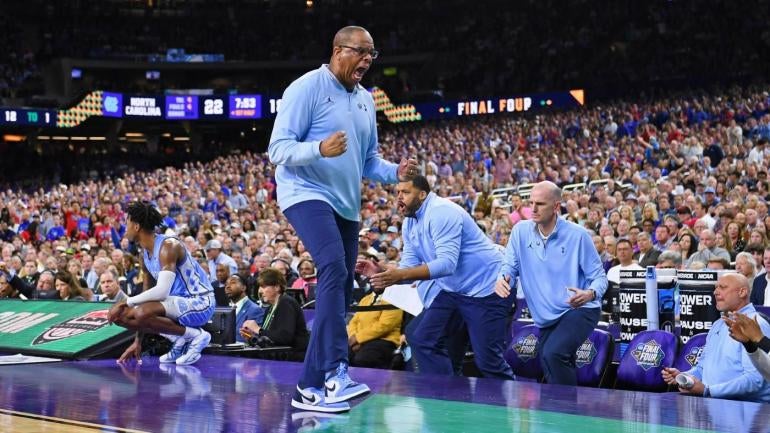
The 2021-22 season was a good one for a lot of coaches going through their first seasons. Below, a thorough rundown of the most successful men in their debut campaigns, either as first-time head coaches or as veterans experiencing a change of scenery. No grades will be handed out here; I save that task for a few years down the road. As an example, I just graded out the most notable hirings of 2018 and sent back those report cards.
Here, we're looking at which decisions by athletic directors paid the biggest immediate dividends in Year One. Last season was more fruitful on the whole than most seasons normally provide. There's a lot of good news to share and a lot of reasons for positivity across the country, in leagues big and small. If you're in a major conference and you made the NCAA Tournament right away, you were immediately successful. If you're in a mid- or low-major conference and significantly upped your win total and/or hit the 20-win threshold, you also apply.
2021-22's most immediately successful hires
| 1 | |
| Hubert Davis: The first 26 games were capricious (UNC was 18-8), but Davis deserves to be at the top of the list. Thanks to Caleb Love's announcement on Sunday, Davis will return almost everyone from a team that went 29-10 and made it to the national title game as a No. 8 seed (just the fifth school to do so). There was also the pair of wins over Duke that are immortal: Coach K's last home L, then the thriller in the Final Four to end the legend's career. All things considered, few men have had a better first season as a head coach, ever, than what Davis just experienced. A restructured contract for Davis is in the works, according to sources, and it shouldn't take too much longer for the school to announce that news. | |
| 2 | |
| Tommy Lloyd: For all of Davis' success, you could cobble together an argument that Lloyd had a better year overall. Only three men have ever coached a team to a No. 1 seed in their first season as a head coach: Bill Hodges, Indiana State (1979); Bill Guthridge, North Carolina (1998); and Lloyd. The Wildcats went 33-4 last season, giving Lloyd an .892 winning percentage. That was No. 2 in the sport to Matt McMahon and Murray State (.912). While Lloyd did inherit a lot of talent from Sean Miller, he also had to recruit much of the roster to stay, then went out and exceeded his reputation that was built up over two decades at Gonzaga. Lloyd won multiple national coach of the year honors. A mammoth debut. | |
| 3 | |
| Mark Adams: The 65-year-old Adams was tremendous in his first season, guiding the Red Raiders to a 27-10 record in the nation's toughest conference and pitting his third-seeded team against No. 2 Duke in the Sweet 16. TTU was narrowly knocked out of the NCAAs by a talented Duke crew, but Adams showed right away that he was the proper successor to Chris Beard. Promoting from within at the power-league rank has become more commonplace in recent seasons. Adams is a good example of why, often, the best choice is the most familiar one. | |
| 4 | |
| T.J. Otzelberger: Iowa State had one of the biggest one-year turnarounds in major-conference history, going from 2-22 to 22-13 — and that included a run to the Midwest's regional semifinals. The Cyclones were picked last in the Big 12 back in October, wound up tied for seventh. Regardless, the team started the season 12-0 with wins over eventual NCAA Tournament teams Memphis, Creighton and Iowa. The arrow is most certainly pointed in the right direction in Ames; losing Tyrese Hunter is a sting, but the Cyclones shouldn't be fading from view. Otzelberger is a natural fit here and could be developing a program that will annually rank among the stoutest defenses in the sport. | |
| 5 | |
| Chris Beard: Texas was projected almost universally in the top 10 of every major media outlet and predictive metric in October of 2021. That didn't come to pass. Beard's mixing bowl of transfers didn't quite match their preseason expectations, but this team was far from a bust. The Longhorns finished 15th at KenPom.com and went 22-12, losing in the second round of the NCAAs as a No. 6 seed to Purdue. All told, it was a satisfactory introductory go of things for Beard and company in Year One. Now Beard gets to retool (somewhat; Teddy Allen and Marcus Carr will be back) and swim in the transfer portal again as he tries to make a program in his image with many resources at his disposal. | |
| 6 | |
| Drew Valentine: When Valentine got the job in early April 2021, he was a 29-year-old who was inheriting one of the best roster situations of any coach in the country. The Ramblers proceeded to slightly outperform preseason predictive metrics: Loyola Chicago was the No. 32 at KenPom at the start of the season; it finished 29th after losing in the first round of the Big Dance as a 10-seed to No. 7 seed Ohio State. You make the big bracket in your first season as a head coach — especially outside of one of the six or seven biggest conferences — you're a success no matter what. | |
| 7 | |
| Shaka Smart: A 19-13, one-and-done NCAA Tournament finish, but it's a season every MU fan would have taken back in November. Smart's team outperformed expectations and made it into the one postseason bracket that matters. Marquette beat the likes of Illinois, Providence, Villanova and swept Seton Hall in the regular season. The season kind of went in waves, but it was a success. Expect some tinkering for '22-23. The first foray was a lurch in the right direction. | |
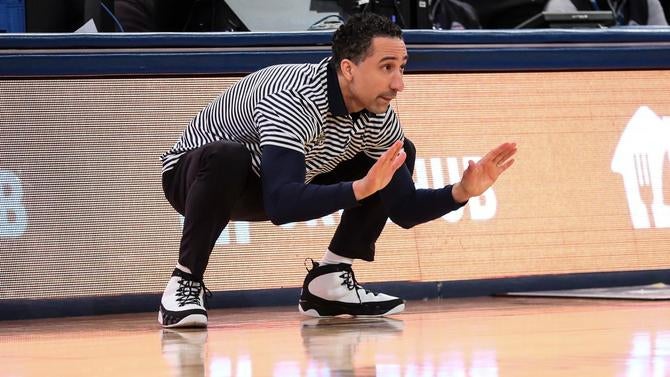
Most immediately successful hires by small schools
You don't need to make the NCAA Tournament to get recognition around these parts. Here were the small-school coaches that were exceptional in their inaugural go-rounds. You'll one day see some of these guys coaching in bigger leagues.
| 1 | |
| Steve Lutz: For as big as the Iowa State turnaround was, consider what Lutz did down at little ol' Texas A&M-Corpus Christi. The school won five games in 2020-21 under former coach Willis Wilson. Lutz left Purdue as an assistant to Matt Painter and led the Islanders to a 23-12 debut, which included a Southland championship and an NCAA Tournament appearance. The school has danced only two times in its history: 2007 and 2022. What's more, Lutz's first season marked the sixth-best win percentage in program history (the school moved to Division I in 2002-03). He was the only first-year mid/low-major coach to make the NCAA Tournament. | |
| 2 | |
| Kyle Neptune: If you want to know the truth, the capsule I wrote for Neptune was written days before Jay Wright retired. So, this reflection has taken on a bit of a different perspective. We are now talking about the head coach at Villanova. That's WILD. Neptune immediately altered the temperature in the room at Fordham, which made his case to be VU's next coach much more achievable. A year ago, Neptune took a job that averaged eight wins the previous four seasons. And in 2020-21, the year before Neptune arrived, Fordham won two (!!) games. Yet Neptune managed to go 16-16. Getting the Rams to .500 (in your first season) in the A-10 is a huge accomplishment. (If you want to know how this capsule was previously written to end, have a chuckle: "If Neptune can get to 20 wins next season, he will find himself on many an AD's list for a bigger job.") | |
| 3 | |
| Brett Tanner: No first-year coach outside a power conference wound up winning more games this season than Tanner, who inherited a steady program from Joe Golding. The Wildcats spent their first eight seasons in D-I, then transitioned to the WAC last season. ACU responded by posting a 25-11 mark, 11-7 in that league, a loss in the title game to New Mexico State sending it to the CBI. Tanner's team ranked No. 1 nationally in turnover percentage. | |
| 4 | |
| Mark Prosser: The first-year Winthrop coach went 23-9, bolstered by a 10-1 record to close out the season. The Eagles lost in the Big South title game to Longwood. The highlight win: a road victory against Washington on Nov. 27. | |
| 5 | |
| Jordan Mincy: The former Florida assistant had a local scootch to Jacksonville and managed to lead the Dolphins to a 21-10 season. How good was this past season for JU? The program hadn't won 21 games since 1985-86, and last won more than that all the way back in 1971. Mincy is a rising coaching star. | |
| 6 | |
| Speedy Claxton: After Joe Mihalich retired, Claxton was given the keys of the program where he once starred as a player. The Pride went 21-11 with a 13-5 mark in a good CAA last season. Included in those 21 wins was a glaring road victory over Arkansas. | |
| 7 | |
| Joe Golding: After taking 14th-seeded Abilene Christian to the second round of the 2021 NCAA Tournament, Golding accepted the UTEP job and promptly improved a 12-12 outfit to a 20-14 squad in his first season. Will he be the guy to get the Miners back to the NCAAs, even though they haven't been since 2010? I could see it. | |
| 8 | |
| Shantay Legans: The Pilots averaged 8.6 wins in five seasons under Terry Porter. Enter: Legans, who managed to flip this ship and get Portland to a 19-15 record. It was the winningest season for the program since 2010-11. Nice gains right away for the coach who left Eastern Washington to do work in the WCC. | |




























